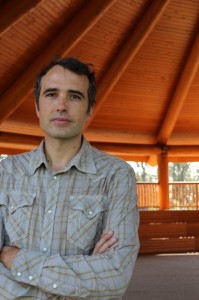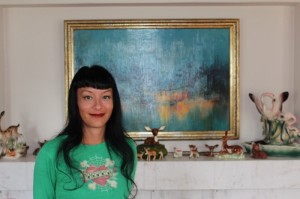Writing is a versatile form of communication. Writing is a way of sharing information from one source to another and, depending on execution, can signify something much deeper than words on a surface.
Getting a particular message out correctly in writing can be difficult because it takes using certain words in a certain way to set certain tones. Camosun College creative writing professor and author Daniel Griffin knows about these difficulties, and he has worked diligently to get to where he is today. But it wasn’t easy.
From dyslexic to dynamic

“Growing up I always felt the need to record,” says Griffin. “I was interested in putting things into words, even though I had dyslexia, problems with reading/writing, and didn’t do well in school.”
One of Griffin’s earliest memories of wanting to record was while he was growing up in England. At seven years old he went to Cornwall for a family vacation; he wanted to keep a journal or diary to remember his holiday, so he took a blank book and pen with him.
“I had such a difficult time choosing what words I wanted to use and had an even more difficult time writing them out,” recalls Griffin. “It was a struggle just to write a few words on the page, so I convinced my mom to write out what I would tell her and she recorded the information for me.”
Griffin believes it takes time and effort to be a great writer and isn’t a big believer in just talent. Even though he’s a parent with a full-time job and is also a creative writing instructor, he still writes for at least two hours every day to keep at it and to continue to improve.
“I always tell my students that the people who are going to succeed with writing are the ones who stick to it,” says Griffin. “Success means something different to everyone, but you can achieve your success if you stick to it.”
With short stories, Griffin writes a single draft all in one go. He sits down with a blank page and only has a dense starting point that his writing can explode from. He prevents himself from thinking ahead with short stories beforehand because he likes to see his stories emerge through the characters by letting his creative side take hold.
“I spend a small amount of time on my first draft and most of my time rewriting,” says Griffin. “My rewriting process can sometimes go on for months, until the story really blossoms to a final product.”
Novel writing is a bit trickier of a writing process in Griffin’s eyes. Rather than starting with a blank page and having the ability to go anywhere with the story, he has to remember what he wrote the day before and make sure to stay on the same tone.
“I feel like anyone involved in creative endeavours needs to push their boundaries by challenging themselves to look at things differently and expand on expression,” says Griffin. “I’m pushing my own boundaries by writing a novel that I’m five years deep into. Novel writing can easily go wrong by not connecting the content properly, so I remind myself of that while being careful to not restrict myself for future writing sessions.”
Two writers, one goal

Like Griffin, Yasuko Thanh has also spent a lot of time and effort to get to where she is today as a writer.
“I started writing when I was very young,” she says. “As soon as I could write I had a diary. Throughout my life my writing has changed from teenage poetry to travel journaling, non-fiction to fiction, and short stories to novels.”
Thanh dropped out of school as a teenager, yet she still had the drive to write poetry. She started seeing her writing in a different light and wanted to direct it towards an audience, so she submitted her poetry to magazines.
“My poetry was terrible. It was pondering all the great problems in human existence, it was really painfully earnest, but not in a good way,” says Thanh. “I Quarry Magazine’s editor Steven Heighten wrote me back himself and had comments and sent me a copy of the 20th anniversary issue and motivated me with a very ‘keep at it’ feeling.”
Thanh would challenge herself to an exercise, recording five different sense perceptions: scents, snatches of dialogue, sights, sounds, and one feeling. Thanh recalls it as a recording of details.
“I didn’t necessarily think that I would maybe use it in my work one day, but used it during my travels more to remember because I don’t have the best memory,” says Thanh. “It’s crazy what vivid memories those senses can trigger. Two years later I won’t even remember certain instances until I read back and reflect.”
Thanh’s earlier works in her short story collection are semi-autobiographical from her own experiences. She says that studying fiction at UVic was a great experience and helped her learn more about plot, which eventually made her a better writer.
“I had one prof that made me do an exercise which was made to make me strengthen in what he thought was weakest with my writing (linear episodic narratives) and I came to an epiphany that you can write a story that starts at the beginning and ends without doing anything fancy,” she says.
Thanh advises that it comes down to trusting your own voice and story. With longer pieces, it’s better to stay on track and not go off onto other tangents because it’s harder to sustain interest in longer stories. Having said that, she feels like fellow author Toni Morrison is great at breaking all of those rules, and she admires Morrison’s writing style.
“Toni Morrison is able to circle and circle and her key event will be something that took place in the past and is a flashback. She breaks all the rules but she can get away with it because she is Toni Morrison,” says Thanh. “But for other cases this is the reason why plots are shaped as arcs, because somehow the same way other things just work, it just works.”
Both Thanh and Griffin are local authors featured at Victoria Writers Festival and will speak about their techniques, work, and craft in further detail at the festival.
“People that want to write should just do it,” says Thanh. “People always say, ‘I wish I could write a story.’ Just do it. If you want to be a writer, then write. Everyone has a story to tell and the best stories are the ones that are simple, pure, and from the writer’s voice.”
Victoria Writers Festival
Camosun College, Lansdowne
October 12-13, $10-$30
